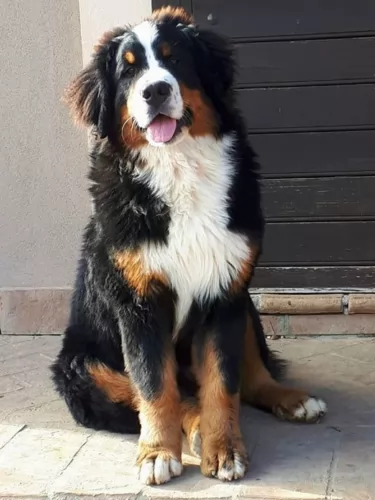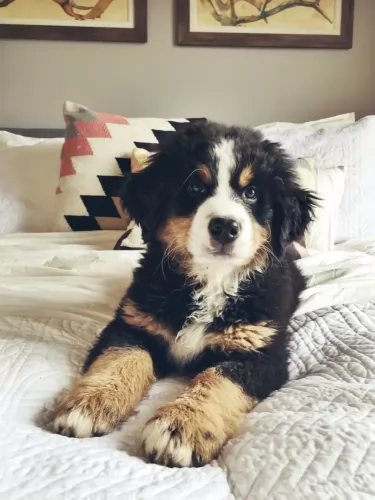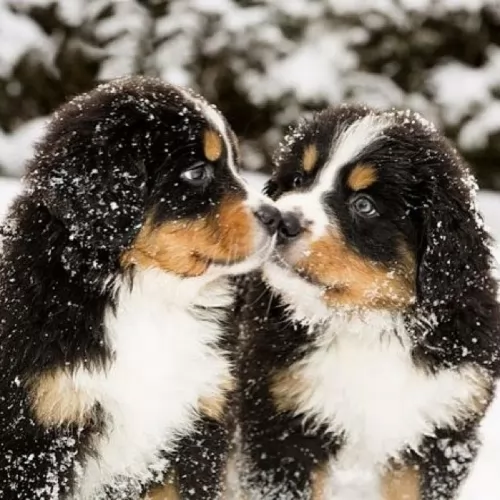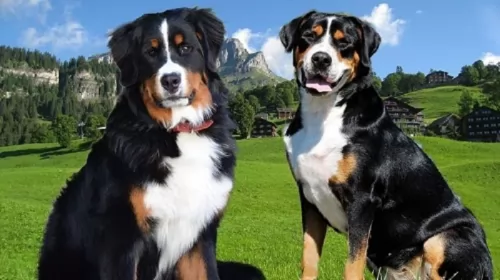 Petzlover
Petzlover Drentse Patrijshond is originated from Netherlands but Mountain Burmese is originated from Myanmar. Drentse Patrijshond may grow 8 cm / 3 inches shorter than Mountain Burmese. Drentse Patrijshond may weigh 39 kg / 85 pounds lesser than Mountain Burmese. Drentse Patrijshond may live 7 years more than Mountain Burmese. Both Drentse Patrijshond and Mountain Burmese has almost same litter size. Drentse Patrijshond requires Moderate Maintenance. But Mountain Burmese requires Low Maintenance
Drentse Patrijshond is originated from Netherlands but Mountain Burmese is originated from Myanmar. Drentse Patrijshond may grow 8 cm / 3 inches shorter than Mountain Burmese. Drentse Patrijshond may weigh 39 kg / 85 pounds lesser than Mountain Burmese. Drentse Patrijshond may live 7 years more than Mountain Burmese. Both Drentse Patrijshond and Mountain Burmese has almost same litter size. Drentse Patrijshond requires Moderate Maintenance. But Mountain Burmese requires Low Maintenance
 The Drentse Patrijshond came about in the 1930-1950s. The breed developed from pointing dogs which originated in Spain, arriving in the Netherlands in the 16th century and being known as Partridge dogs.
The Drentse Patrijshond came about in the 1930-1950s. The breed developed from pointing dogs which originated in Spain, arriving in the Netherlands in the 16th century and being known as Partridge dogs.
The eastern part was known as the Province of Drenthe, and it is this area where these Partridge dogs were bred exclusively, not being mixed with other unknown breeds.
After World War II the Drentse Patrijshond was also recognized by the FCI. It was a popular dog in the Netherlands and the breed was also recognized by the Dutch Kennel Club in 1943. The Dretse’s popularity grew in other European countries too. In the 1960s some of the dogs entered the United States and in 2008 the Drentse Patrijshond Club of North America was established.
 The Burmese Mountain Dog is quite often taken to be the Bernese Mountain Dog, a Swiss farm dog. However, the Burmese Mountain Dog comes not from Switzerland but from Myanmar and Burma. The Burmese was bred to hunt skunks and guard livestock for the northern tribesman of Myanmar. The way they hunted for the aggravating skunks was to hide themselves in the underbrush and wait for the skunk to go by. Their facial markings confuse skunks when they see him in the bush with a black and white face. At the same time, his rust color lets the hunter know he is the dog not the skunk.
The Burmese Mountain Dog is quite often taken to be the Bernese Mountain Dog, a Swiss farm dog. However, the Burmese Mountain Dog comes not from Switzerland but from Myanmar and Burma. The Burmese was bred to hunt skunks and guard livestock for the northern tribesman of Myanmar. The way they hunted for the aggravating skunks was to hide themselves in the underbrush and wait for the skunk to go by. Their facial markings confuse skunks when they see him in the bush with a black and white face. At the same time, his rust color lets the hunter know he is the dog not the skunk.
The Mountain Burmese is an incredible athlete despite the size. They are agile. They are quick. They can climb trees – as many as fifty feet while chasing a skunk. They also make a great companion and love to be a family dog. They are calm and gentle as an adult and great with kids. They are easily trained but remember they can climb trees. However, they do not do well with cats that are black and white or solid black because they confuse them with the skunk prey.
 The Drentse Patrijshond is a medium to large sized dog standing between 55 and 63cm in height and weighing anything between 18 and 30kg. He is a working dog and known by other names such as Dutch Partridge Dog and Dutch Gundog among others.
The Drentse Patrijshond is a medium to large sized dog standing between 55 and 63cm in height and weighing anything between 18 and 30kg. He is a working dog and known by other names such as Dutch Partridge Dog and Dutch Gundog among others.
The coat of the dog is medium length and dense and is mostly white with reddish brown markings. People looking at him liken him to a spaniel, pointer or setter kind of dog. He is athletic and muscular with a long feathery tail, floppy ears and a brown nose with amber colored eyes.
The Drentsche Patrijshond is an amicable family dog who is relaxed and calm around other pets in the home as well as children. In fact it is the kind of dog that forms a strong bond with his human family, not liking to be left alone.
He is a lively, alert and playful dog with a tendency to be a bit stubborn but this is easily dealt with when he undergoes training and socialization. He is an adaptable dog, being able to fit into life in the city or the countryside, just so long as his beloved owners are close by. However, he is very active and will require an owner who will take time out to take him on walks or involve him in lots of outdoor activities.
 The Mountain Burmese Dog is a large, sturdy, well built and athletic canine. Strong and well balanced, he is agile and athletic when it comes to the work, he has to do in chasing skunks. He has a full body with a large head and dark, oval eyes. The Burmese has triangular ears close to his head and medium in size. With a flat, broad skull the muzzle is straight and strong. They have black noses and a scissors bite, on their muscular, strong neck. With a deep chest and broad back, they have strong ribs. Finally, the tail is bushy, long and hangs low.
The Mountain Burmese Dog is a large, sturdy, well built and athletic canine. Strong and well balanced, he is agile and athletic when it comes to the work, he has to do in chasing skunks. He has a full body with a large head and dark, oval eyes. The Burmese has triangular ears close to his head and medium in size. With a flat, broad skull the muzzle is straight and strong. They have black noses and a scissors bite, on their muscular, strong neck. With a deep chest and broad back, they have strong ribs. Finally, the tail is bushy, long and hangs low.
 The Drentse Patrijshond is a breed of dog that is particularly human orientated – just loving being around his human family.
The Drentse Patrijshond is a breed of dog that is particularly human orientated – just loving being around his human family.
He forms a deep bond with those that care for him and he can’t bear to be separated from his human family. The dog has always had a strong hunting instinct but these days this sweet, loyal dog is much more a devoted family pet who is more than happy to come indoors and make himself at home among his family members.
 The Drentse is a fairly healthy dog breed, with a life span of 12 to 15 years. No matter how healthy your dog, there will always be some health issues it may face. Environmental factors and diet can play an important part in his wellbeing.
The Drentse is a fairly healthy dog breed, with a life span of 12 to 15 years. No matter how healthy your dog, there will always be some health issues it may face. Environmental factors and diet can play an important part in his wellbeing.
Health concerns with this breed can include progressive retinal atrophy, hip dysplasia as well as hereditary stomatocytosis. This is a disorder that affects the dog’s cells walls.
Too much fluid gets into the cells and this damages red blood cells. Some breeds are more prone to this disorder, and the Drentse Patrijshond is one. It is an hereditary disorder that results in chronic anemia and liver disease.
 The kind of health issues that most large or giant dogs have to deal with are some of the same things that this breed dealt with.
The kind of health issues that most large or giant dogs have to deal with are some of the same things that this breed dealt with.
 This dog is quite a heavy shedder, but even so, he won’t need professional grooming – just a good brushing twice a week.
This dog is quite a heavy shedder, but even so, he won’t need professional grooming – just a good brushing twice a week.
The teeth will need to be brushed 2 or 3x a week and because he has floppy ears, these will need to be checked for infection. It’s a good idea to clean them with some special dog ear cleanser, but if you’re not sure how, your vet or a professional groomer can do it for you.
Cut your dog’ nails, but once again if you think you might cut into the quick of the nail, causing bleeding and pain, a professional groomer can do it for you.
The Drentsche Patrijshond will require quality dry dog food. Speak to your vet about the best kibble that ensures your pet gets his full quota of vitamins and minerals. Add in cooked brown rice, vegetables and chicken from time to time and include some raw meat wherever possible. Adding in some raw meat helps to stave off dry, red, irritated skin. Your pet will also need access to fresh, cool water day and night.
 Feed a high quality dog food designed for large or giant puppies. Feed 3times a day 2.5 times for puppies and go easy on the treats
Feed a high quality dog food designed for large or giant puppies. Feed 3times a day 2.5 times for puppies and go easy on the treats
There is a definite tendency for these dogs to become obese. Don’t overfeed. Don’t free feed. Large breed high quality dog food should be fed 2 times a day and go easy on the treats. Watch his weight.
strength, stamina
The breed is definitely athletic and active. They love to chase and take long walks daily. They need a large yard but be careful as they can climb trees and your fence. They are great companions when backpacking and camping. If there are skunks in the area however watch out! These are hunting dogs despite their size and they would do very well in barn hunt and field trials.